Hiding and Seeking est un film de genre Documentaire
Hiding and Seeking (2004)
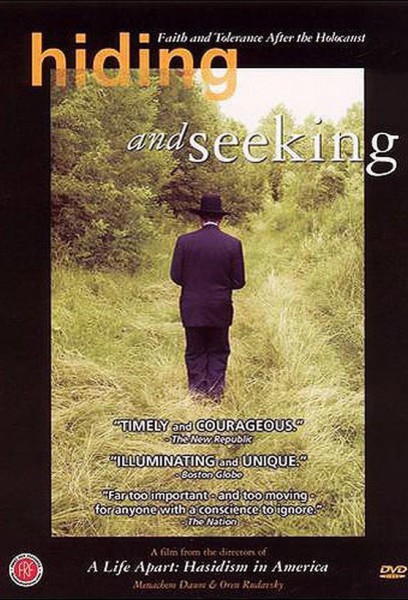
Si vous aimez ce film, faites-le savoir !
Genres Documentaire
Themes Le racisme, Religion, Documentaire sur la discrimination, Documentaire sur le droit, Documentaire sur la guerre, Documentaire historique, Documentaire sur une personnalité, Documentaire sur la religion, Politique, Religion juive, Documentaire sur la Seconde Guerre mondiale
Note77%










Hiding and Seeking: Faith and Tolerance After the Holocaust is 2004 documentary film about Menachem Daum, an Orthodox Jew and son of German Nazi Holocaust survivors who has spent his life interviewing survivors about the impact of the Holocaust on their lives. After hearing a disturbing tape of a rabbi openly preaching "hatred" of non-Jews, Daum attempts to raise an outcry in his Brooklyn Orthodox community. When ignored by the media and community leaders, Daum decides to fly to Israel to discuss the matter with his two sons, concerned with the "ethical legacy" he is responsible for leaving them.
Hiding and Seeking was produced, written, and directed by Menachem Daum and Oren Rudavsky and aired on PBS's Point of View series in 2005. It has been met with high critical praise, receiving a 90% "Fresh" rating on Rotten Tomatoes.
Commentaires
Postez un commentaire :
Suggestions de films similaires à Hiding and Seeking
Il y a 8861 ayant les mêmes genres cinématographiques, 12785 films qui ont les mêmes thèmes (dont 60 films qui ont les mêmes 11 thèmes que Hiding and Seeking), pour avoir au final 70 suggestions de films similaires.Si vous avez aimé Hiding and Seeking, vous aimerez sûrement les films similaires suivants :

Prisoner of Paradise (2002)
, 1h36Réalisé par Malcolm Clarke
Origine Etats-Unis
Genres Documentaire
Thèmes Film traitant du cinéma, Le racisme, Religion, Documentaire sur le monde des affaires, Documentaire sur le cinéma, Documentaire sur la discrimination, Documentaire sur le droit, Documentaire sur la guerre, Documentaire historique, Documentaire sur une personnalité, Documentaire sur la religion, Politique, Religion juive, Documentaire sur la Seconde Guerre mondiale, Documentaire sur les films
Acteurs Ian Holm, Renée Saint-Cyr, Hans Albers, Marlene Dietrich, Kurt Gerron, Peter Lorre
Note74%





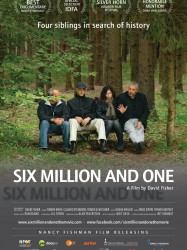
Six Million and One (2012)
, 1h33Genres Documentaire
Thèmes Le racisme, Religion, Documentaire sur la discrimination, Documentaire sur le droit, Documentaire sur la guerre, Documentaire historique, Documentaire sur une personnalité, Documentaire sur la religion, Politique, Religion juive, Documentaire sur la Seconde Guerre mondiale
Note66%





Joseph Fischer's memoir was discovered only after his death. His children refused to confront it, except for David, the filmmaker, for whom it became a compass for a long journey. When David found it unbearable to be alone in the wake of his father's survival story and in his struggle not to lose his sanity, he convinced his brothers and sister to join him in the hope that this would also contribute to releasing tensions and bring them as close as they used to be. His siblings, for their part, couldn’t understand why anyone should want to dig into the past instead of enjoying life in the present. The journey eventually leads the Fishers into the dark depths of the B8 Bergkristall tunnels, part of the Austrian KZ Gusen II concentration camp, where their father endured forced labor during the Holocaust. Illuminated only by flashlights, they seek meaning in their personal and family histories and undergo surgical and revealing discussions about family, survival and individualism only to come to the realization that they are unable to fully understand their father's past and the events that haunted him. Joseph Fischer's last couple of weeks at Gunskirchen concentration camp, were an inhuman experience that blocked his writing. In order to find out what his father failed to describe about Gunskirchen's liberation David located veterans of the 71st Infantry Division who liberated the camp. The elderly soldiers are still haunted and traumatized by the horrific sights they came across when entering the camp. Through their journey, the Fishers become emblematic of the entire second generation who are still grappling with the experience of their survivor parents.

Anne Frank Remembered (1995)
, 1h57Genres Drame, Documentaire
Thèmes L'enfance, Le racisme, Religion, Documentaire sur la discrimination, Documentaire sur le droit, Documentaire sur la guerre, Documentaire historique, Documentaire sur une personnalité, Documentaire sur la religion, Politique, Religion juive, Documentaire sur la Seconde Guerre mondiale
Acteurs Kenneth Branagh, Glenn Close, Joely Richardson
Note80%





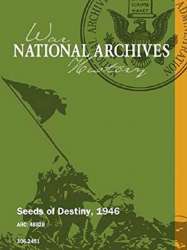
Seeds of Destiny (1946)
, 20minutesRéalisé par David Miller
Origine Etats-Unis
Genres Guerre, Documentaire
Thèmes L'enfance, Le racisme, Religion, Documentaire sur la discrimination, Documentaire sur le droit, Documentaire sur la guerre, Documentaire historique, Documentaire sur une personnalité, Documentaire sur la religion, Politique, Religion juive, Documentaire sur la Seconde Guerre mondiale
Acteurs Ralph Bellamy
Note62%





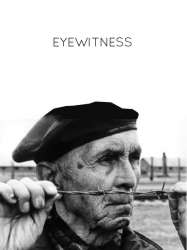
Eyewitness (1999)
Origine Etats-Unis
Genres Guerre, Documentaire
Thèmes Le racisme, Religion, Documentaire sur l'art, Documentaire sur la discrimination, Documentaire sur le droit, Documentaire sur la guerre, Documentaire historique, Documentaire sur une personnalité, Documentaire sur la religion, Politique, Religion juive, Documentaire sur la Seconde Guerre mondiale
Note69%





 , 55minutes
, 55minutesGenres Biographie, Documentaire
Thèmes Le racisme, Religion, Documentaire sur la discrimination, Documentaire sur le droit, Documentaire sur la guerre, Documentaire historique, Documentaire sur une personnalité, Documentaire sur la religion, Politique, Religion juive, Documentaire sur la Seconde Guerre mondiale
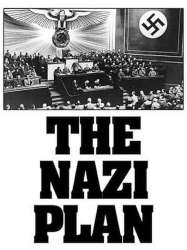
The Nazi Plan (1945)
Réalisé par George Stevens
Origine Etats-Unis
Genres Documentaire
Thèmes Le racisme, Religion, Documentaire sur la discrimination, Documentaire sur le droit, Documentaire sur la guerre, Documentaire historique, Documentaire sur une personnalité, Documentaire sur la religion, Politique, Religion juive, Documentaire sur la Seconde Guerre mondiale
Note67%





The film's central footage and themes "relied heavily" on the work of German film maker Leni Riefenstahl, in particular the 1935 movie Triumph des Willens (Triumph of the Will).
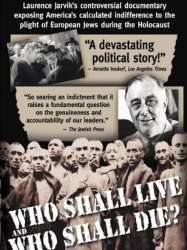 , 1h30
, 1h30Origine Etats-Unis
Genres Documentaire
Thèmes Le racisme, Religion, Documentaire sur la discrimination, Documentaire sur le droit, Documentaire sur la guerre, Documentaire historique, Documentaire sur une personnalité, Documentaire sur la politique, Documentaire sur la religion, Politique, Religion juive, Documentaire sur la Seconde Guerre mondiale
Note74%





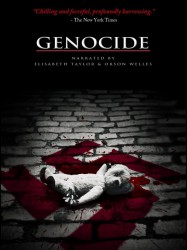
Genocide (1982)
, 1h30Origine Etats-Unis
Genres Drame, Documentaire, Historique
Thèmes Le racisme, Religion, Documentaire sur la discrimination, Documentaire sur le droit, Documentaire sur la guerre, Documentaire historique, Documentaire sur une personnalité, Documentaire sur la religion, Politique, Religion juive, Documentaire sur la Seconde Guerre mondiale
Acteurs Elizabeth Taylor, Orson Welles
Note72%






Hanuszka (2006)
, 1h6Genres Documentaire
Thèmes Le racisme, Religion, Documentaire sur la discrimination, Documentaire sur le droit, Documentaire sur la guerre, Documentaire historique, Documentaire sur une personnalité, Documentaire sur la religion, Politique, Religion juive, Documentaire sur la Seconde Guerre mondiale
 Connexion
Connexion